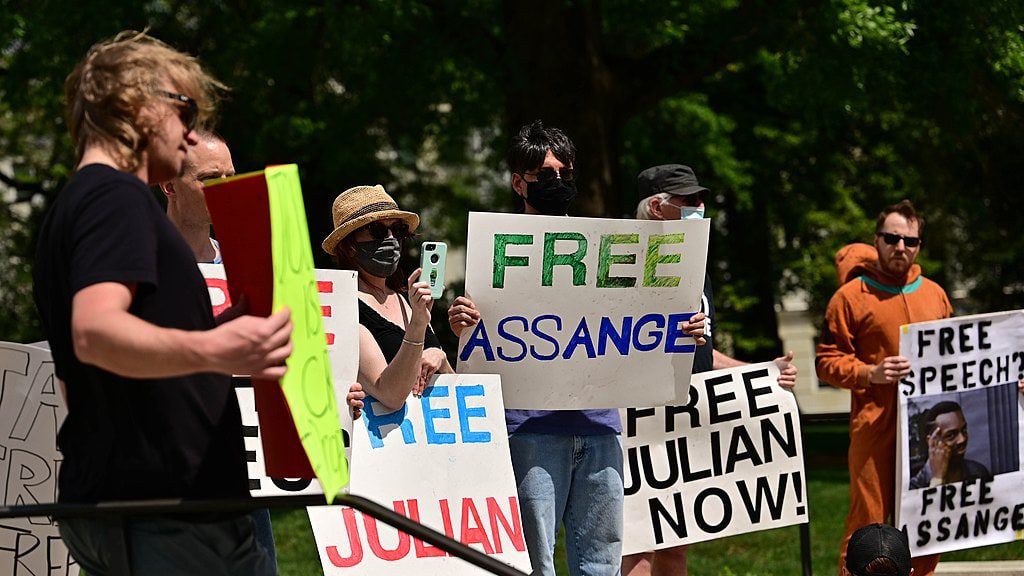
Julian Assange has been denied permission to appeal to the UK Supreme Court against his extradition to the U.S. The court made its announcement on Monday, March 14th. The decision to extradite the Wikileaks founder or not now rests with the Interior Minister, AP reports.
Assange—presently incarcerated in the UK—is wanted by U.S. authorities for having published thousands of classified documents between 2010 and 2011. If convicted, he faces a 175-year prison term. As previously reported by The European Conservative, in mid-December of 2021 the U.S. had won an appeal to have Assange extradited to the country.
This was made possible by London’s High Court decision to overturn an earlier ruling, which stated that Assange should be spared extradition over his mental health problems. The High Court was persuaded to do this via a package of assurances given by the U.S. These included a guarantee that Assange would not be held in a so-called “ADX” maximum security prison and that he could be transferred to his native Australia to serve his sentence, if convicted. The willingness to extradite Assange based on such informal pledges, his legal team found “highly disturbing,” citing their fear that he might constitute a suicide risk.
Determined to fight the decision, they requested permission to file an appeal to the Supreme Court. In January 2022, this was allowed. On Monday however, the Supreme Court said it would not grant their case a hearing: “the reason given is that the application did not raise an arguable point of law,” a Supreme Court spokesperson said. Options to avoid extradition are becoming few. Should it be ratified by Home Secretary Priti Patel, Assange’s only way of avoiding that fate—barring appealing to the European Court of Human Rights—is to challenge Patel’s decision, if in favor, by judicial review.
In a statement released on Monday, Assange’s legal team in the UK regretted that “the opportunity has not been taken to consider the troubling circumstances in which requesting states can provide caveated guarantees after the conclusion of a full evidential hearing.” They have made known they will send submissions to the Home Secretary within the next four weeks.
Barry Pollack, Assange’s U.S.-based lawyer, found the decision “extremely disappointing,” but said that Assange “will continue the legal process fighting his extradition to the U.S. to face criminal charges for publishing truthful and newsworthy information.” Amnesty International called the Supreme Court’s pronouncement “a blow to justice.”
It is no less of a blow not only to Assange, but to his family, friends, and supporters. One of the more famous among them is Pink Floyd co-founder Roger Waters, who said that “if they destroy the Fourth Estate, which they are trying to do by destroying Assange, they destroy the world. That’s it. We’re done. If we no longer have a voice, we’re done.”
Roger Waters: "Our voices will become louder and louder and louder until Julian #Assange is set free… If we no longer have a voice, we're done" #FreeAssangeNOW @rogerwaters pic.twitter.com/OKy87plIJL
— Defend Assange Campaign (@DefendAssange) March 14, 2022
Excerpts from a Substack newsletter by Assange’s fiance Stella Moris, with whom he has two children, read:
Just this morning on our way to school, our four-year-old son asked me when daddy will come home. Julian’s life is being treated as if it were expendable. He has been robbed of over a decade of liberty, and three years from his home and his young children who are being forced to grow up without their father.
A system that allows this is a system that has lost its way.…
The cruelty against Julian is corrupting. It corrupts our most cherished values and institutions. They will be extinguished and lost forever unless this travesty is brought to an end.
The fight for freedom will go on, until he’s freed.
One day before the Supreme Court’s decision, Moris had announced she and Assange had been given permission to marry in prison later this month.
